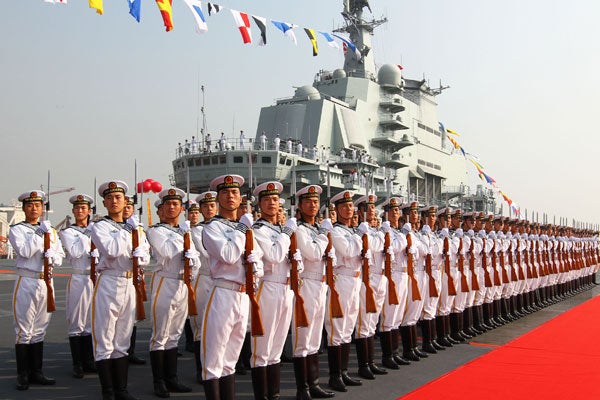Chinese news reports today indicate that Chinese Communist Party (CCP) General Secretary Xi Jinping (who is also the president of China), at a study session of the CCP Politburo (the Party’s top leadership), emphasized the importance of maritime power.
This is not a newfound interest but instead reflects a long-standing and growing focus on that domain. It also underscores why ongoing tensions as China presses maritime territorial claims against its neighbors (many of whom are American allies) is not simply a passing issue but likely to be a long-standing concern.
In the 2010 China’s Ocean Development Report from the State Oceanic Administration, the Chinese referred to the littoral waters as China’s “blue soil,” implying that territorial claims to the surrounding waters are as fundamental as the claims to land territory. In the same report, the Chinese made their first official statement that they were building and developing a carrier fleet.
This fits with previous Chinese leader Hu Jintao’s important directives to the People’s Liberation Army (PLA) regarding its “new historic missions,” wherein upholding China’s interests in key domains, including maritime, are laid out. Being able to establish maritime dominance is ranked alongside space and cyber dominance in importance.
This growing focus on the sea also fits with Chinese doctrinal revisions, where joint operations have become a core concept in PLA thinking. Hu Jintao’s “Military Thoughts on National Defense and Army Building,” meanwhile, were added to the pantheon of Chinese military thinking after last year’s 18th Party Congress, elevating the new missions (and expanding their meaning) to the level of long-term planning guidance.
With the elevation of General Fan Changlong to vice chairmanship of the Central Military Commission (CMC)—the actual leadership body of the PLA—ironically, naval activities are likely to become even more important. General Fan was promoted from commanding the Jinan Military Region (MR) to a vice chairmanship of the CMC. Such a two-grade promotion is very rare and arguably is evidence of the importance of General Fan’s work in the Jinan MR. Under his command, the Jinan MR was regularly described in the Chinese military press as practicing joint operations, often involving naval forces. Given that service chiefs play a lesser role in the management of the PLA, Fan’s previous role in Jinan arguably makes him a better advocate for the rising role of naval forces.
The head of the PLA Navy (PLAN), Admiral Wu Shengli, meanwhile, is one of the holdovers from the previous CMC who will lend leadership stability—and, therefore, arguably programmatic and budgetary protection for the PLAN—through 2017.
As the Chinese incorporate their new aircraft carrier—including conducting flight operations far ahead of predictions—and commission a variety of new surface combatants, developments in the PLA leadership point to an increasingly capable PLAN throughout Admiral Wu’s term. That this is also a priority at the highest level of China’s civilian party leadership portends a continued strengthening of Chinese power in the space where it most directly comes into contact with American interests in the region: the sea.































